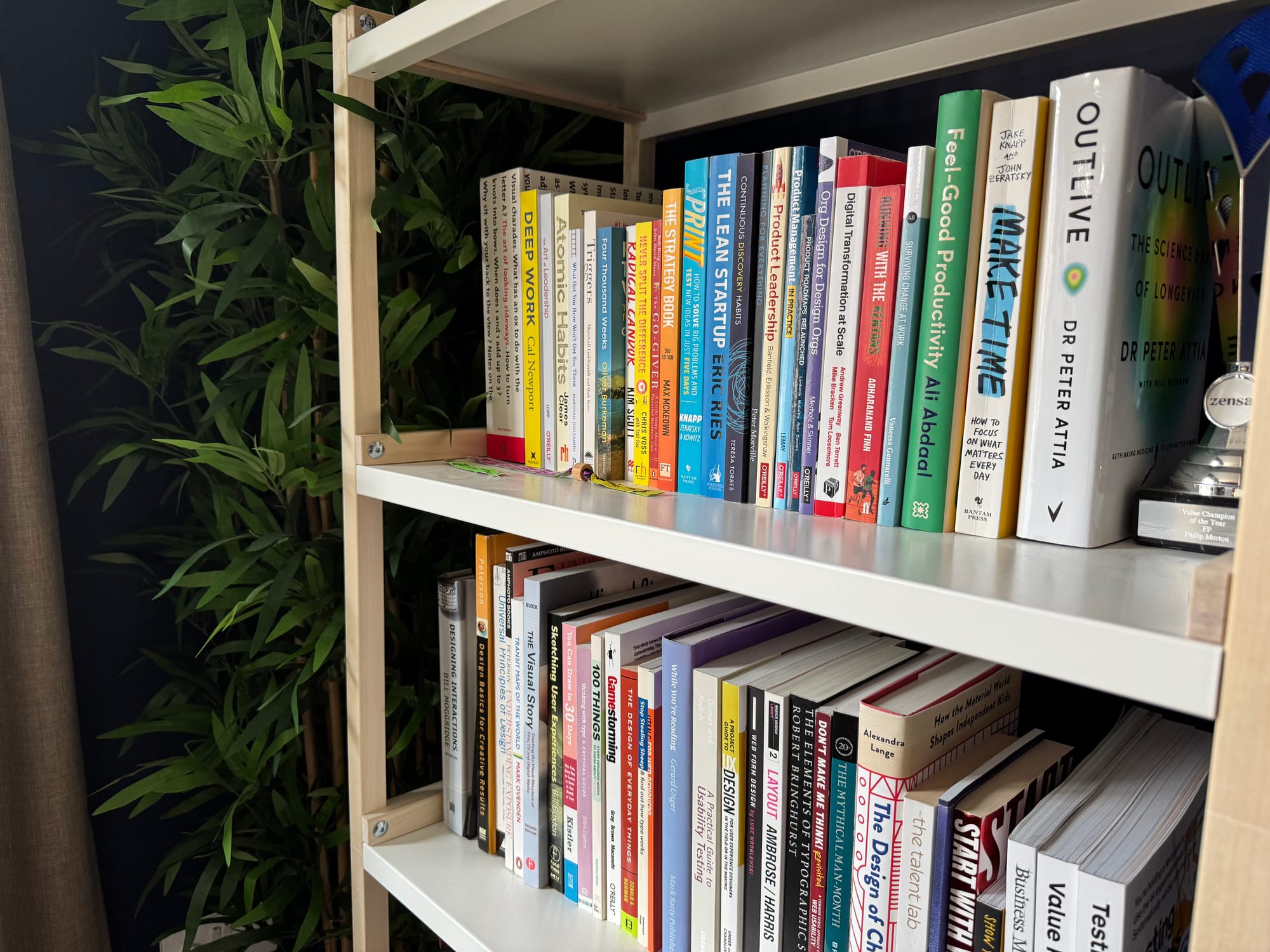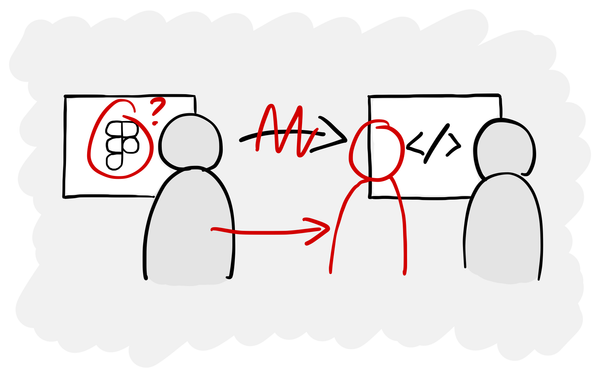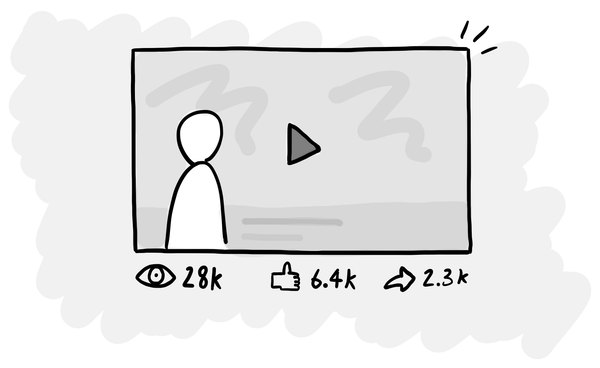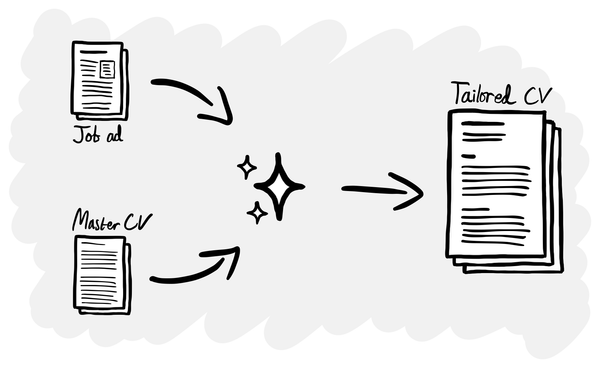Why and how to increase the breadth of your skills
Practical steps to add more variety to (and future-proof) your career.

No-one knows how the future of work is going to play out, but what people seem to agree is that:
- Expertise is valuable, since it lets you direct AI and judge its output
- Teams will get smaller, so people who can take on multiple roles will be more valuable.
Most practitioners beyond the early stages of their career therefore need to focus on expanding their skillset to be more of a generalist.
This is something worth doing right now, not just in anticipation of the future. The more skills you have, the more ways you can be useful to the people you work with. The more of the design and development process you can cover, the more indispensable you become.
The five components of learning a new skill
The fastest way to learn something new is to incorporate all of the following:
- Understand the theory: use books, training courses, conferences, articles, podcasts, YouTube videos, ask an LLM, talk to your colleagues and so on.
- Observe how others work: shadow your colleagues, look at their work-in-progress, ask them to talk you through what they’re doing.
- Practice the skill: get or create opportunities to try it out yourself. Use mock exercises if it’s hard to get the opportunity to do this in real project work.
- Analyse your performance: reflect on what you’ve done, get feedback from other people who already have the skill.
- Get coaching from people who can do it and build relationships with people who can help you.
Start with adjacent skills, not distant ones
Learning new skills takes time and effort, which is why it can feel daunting. This is especially the case if you try to learn something that is far away from your comfort zone.
Think about the five ingredients in the list above:
- It’s much easier to observe how others work if they work around you every day.
- It’s easier to get coaching if you already work with people who have that skill.
- It’s easier to practice a skill if the work you’re already doing is related.
If you want to broaden your skills, this is why it makes most sense to start with adjacent skills, not distant ones. Build outward from your existing knowledge rather than starting from scratch in a completely new field.
If you’re a researcher, UX design is a natural next step because you already have expertise in what people find usable or not. If you're a content designer, AI prompting is essentially just another form of writing.
Ask yourself: what’s the one skill, that if I had it, would allow me to do a different role?
Finding your gaps
If you find that question hard to answer, here are a few ways to reveal the next skill to learn:
- Use AI to interview you: upload your CV and portfolio, then get AI to ask you 10 questions to help it identify what you should learn next. You could even feed it job descriptions of adjacent roles or other people’s profiles. Remember, the more you give it, the better the suggestions will be.
- Ask the person who resources your team about near-misses – the times when you were considered for a project or role but didn’t get it. What specific skills were you missing or perceived to have missing?
- Look at people that you admire: what skills do they have that you don’t? You could ask them directly what they think you should add to your skillset next.
- Get feedback from those you work with: ask them what skills, if you had them, would have made your contribution to the team even more valuable.
You’re probably overestimating the effort it takes to get started
Even if you know what you should learn next, it’s another thing to make progress towards it.
Too often when we think about learning a new skill, we think of the time it will take to master it, rather than how long it will take to get to a basic level of competency. We see people who are experts and think of the many years they’ve had to get there – it seems impossible that we could do the same.
But you’re not trying to master each new skill. That’s not what being a generalist is about.
Learning new skills has never been easier, with all the resources available online (plus AI). You’d be surprised how far you could get in a few hours or days.
Recently I was working on a project where the need shifted from research and strategy to executing design. The only thing stopping me from contributing was my limited Figma knowledge. I spent a few hours learning auto layout by watching YouTube videos, and suddenly I could participate much more in the process.
Adjust your expectations and new skills seem much more attainable:
- You can’t learn design in a day, but you can learn the basics of Figma in a day.
- You can’t learn UX research in a day, but you can learn how to write a discussion guide in a day.
- You can’t learn how to code in a day, but you can learn the basic syntax of HTML in a day.
Sometimes we have several days or even whole weeks between projects – imagine what you could learn then!
Motivation is everything
If you can pick up skills so quickly, why aren’t we doing it all the time?
The reality is that you need motivation to learn new things. It takes curiosity and energy, which maybe we don’t have at the end of a tough work day after we’ve put the kids to put to bed.
Many people go whole years of their career without really trying to learn anything new. Sure, they pick up things in the work, but they spend almost no time deliberately learning new skills unless they’re sent on training courses. I am guilty of this in many years of my career – sometimes you just don’t have the energy or inclination to step outside your comfort zone and take on something new.
What you need to do is find a clear ‘why’ for the thing you’re learning.
If you are learning a skill because someone told you you to or because you’re afraid that AI might take your job, you are not going to follow through with it. These are extrinsic motivations.
What you need is an intrinsic motivation: a reason that genuinely excites you. Something that sparks your curiosity, that connects to the kind of work you want to be doing or the person you want to become.
Learning happens through hard work, not by magic
Even with a clear goal and motivation, learning new skills takes time and energy.
If you are deliberate about learning, you can develop your skills much faster than if you just come to work and get the job done with as little effort as possible.
Think about two athletes: one who trains by running laps all day without thinking vs. one who is tracking their times, analysing their gait, employing a coach and thinking about how they are training.
Which athlete is going to progress faster?
Think of every project as an opportunity to learn or practice a new skill. Have a plan for what you're going to work on. Keep a learning log or tracker. Schedule dedicated time each week for skill development. Use habit systems to make it stick.
Most importantly, be proactive about creating opportunities rather than waiting for them to appear.
Step out of your comfort zone and make a start
Broadening your skills is a logical and calculated response to the trends in our industry, but fear of an uncertain future is not the best motivation to start learning new skills.
A better reason is that the more skills you have, the more interesting and varied your work will become. Learning keeps you engaged and prevents the boredom that comes from doing the same thing repeatedly. Plus it makes sense for your career.
The present and the future belong to people who can work across boundaries, not just within them. The question isn’t whether you should broaden your skills – it’s which skill you’re going to start with next.





